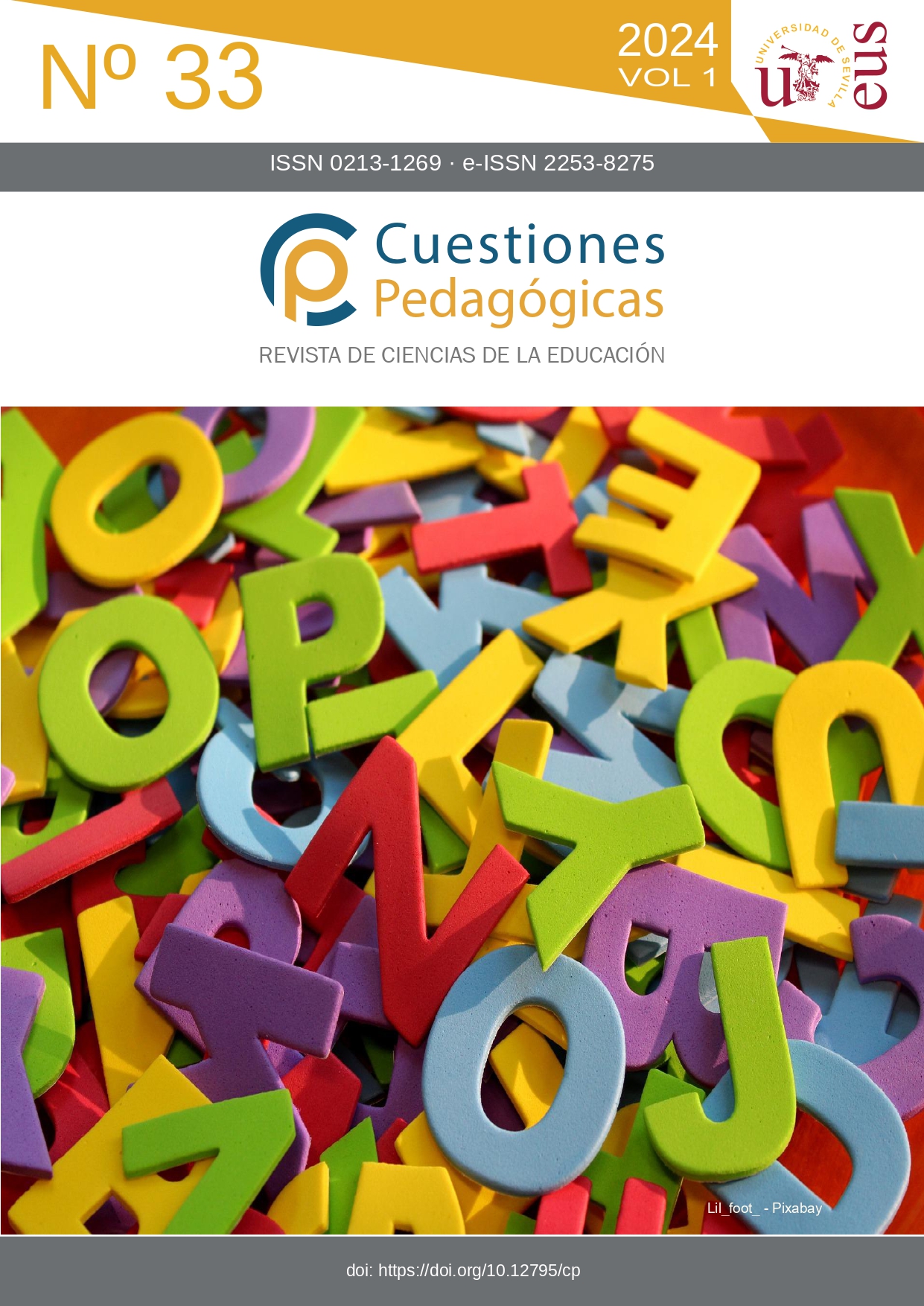L'apprentissage assis : une synergie pédagogique efficace dans la pratique pédagogique universitaire
DOI :
https://doi.org/10.12795/CP.2024.i33.v1.06Mots-clés :
Apprentissage en situation, efficacité pédagogique, formation universitaire, responsabilité sociale de l'éducation, théorie constructiviste.Résumé
Cet article traite de la mise en œuvre de la théorie de l'apprentissage situé dans la pratique universitaire, en soulignant sa pertinence dans un environnement éducatif en constante évolution. La recherche adopte une approche mixte, utilisant des données quantitatives et qualitatives obtenues auprès d'enseignants universitaires de l'État de Sao Paulo, au Brésil. Les résultats révèlent une connaissance positive de la théorie, mais aussi des obstacles à sa mise en œuvre, tels que le manque de soutien institutionnel et les barrières culturelles. L'intégration de la théorie dans la planification des programmes d'études montre un lien entre les connaissances théoriques et leur application pratique. Les perceptions de l'efficacité de la théorie soulignent les améliorations de la participation, de la compréhension et de la motivation des étudiants. Les obstacles et les défis à la mise en œuvre comprennent la charge de travail et la résistance des étudiants. Une forte demande de formation continue est identifiée, l'accent étant mis sur l'adaptation de la formation aux différentes disciplines. Du point de vue de la responsabilité sociale de l'éducation (RSE), l'importance de relever ces défis pour contribuer au développement holistique des étudiants et de la société est soulignée. Le lien entre la théorie de l'apprentissage situé et la RSE est renforcé par la collaboration entre les enseignants et l'adaptabilité dans l'apprentissage tout au long de la vie, montrant l'impact positif potentiel sur la formation de citoyens éthiques et socialement engagés.
Téléchargements
Références
Bennasar-García, M. I. (2020). La innovación educativa en educación física, una posibilidad pedagógica trascendente en el ámbito universitario. Revista EDUCARE - UPEL-IPB - Segunda Nueva Etapa 2.0, 24(3), 265–289. https://doi.org/10.46498/reduipb.v24i3.1387
Bonfield, C. A., Salter, M., Longmuir, A., Benson, M., & Adachi, C. (2020). Transformation or evolution?: Education 4.0, teaching and learning in the digital age. Higher Education Pedagogies, 5(1), 223-246. https://doi.org/10.1080/23752696.2020.1816847
Cakmakci, G., Aydeniz, M., Brown, A., & Makokha, J. M. (2020). Situated Cognition and Cognitive Apprenticeship Learning. In B. Akpan & T. J. Kennedy (Eds.), Science Education in Theory and Practice (pp. 255-270). Springer Texts in Education. Springer. https://doi.org/10.1007/978-3-030-43620-9_20
Espinoza, S. L. (2020). El aprendizaje: posibilidades teóricas para comprenderlo más allá de la escuela. Revista RedCA, 2(6), 22-36. https://revistaredca.uaemex.mx/article/view/13937. https://doi.org/10.36677/redca.v2i6.13937
Inostroza-Araya, L., Santander-Ramírez, V., y Severino-González, P. (2020). Ética y actitud hacia los valores que promueve la universidad. Revista Lasallista de Investigación, 17(1), 291-300. https://doi.org/10.22507/rli.v17n1a25
Kafai, Y., Proctor, C., & Lui, D. (2020). From theory bias to theory dialogue: embracing cognitive, situated, and critical framings of computational thinking in K-12 CS education. ACM Inroads, 11(1), 44-53. https://doi.org/10.1145/3381887
Latorre-Vega, A. G., Perez, C., Lora, A., Castro, E., y Acuña-Beltran, L. F. (2023). Relevancia actual del Aprendizaje Significativo en la educación médica. Revista Española de Educación Médica, 5(1). https://doi.org/10.6018/edumed.590361
Lave, J., & Wenger, E. (1991). Situated learning: Legitimate peripheral participation. Cambridge university press.
Ledger, S., & Fischetti, J. (2020). Micro-teaching 2.0: Technology as the classroom. Australasian Journal of Educational Technology, 36(1), 37–54. https://doi.org/10.14742/ajet.4561
López, N., Álzate, L., Echeverri, M., & Domínguez, A. (2021). Práctica pedagógica y motivación desde el aprendizaje situado. Tesis Psicológica, 16(1), 178-201. https://doi.org/10.37511/tesis.v16n1a9pp.178-201
Maridueña-Torres, R. A. (2022). Estrategias didácticas en el nivel universitario desde un enfoque dinámico de aprendizaje. Revista Científica Ciencia Y Tecnología, 22(33). https://doi.org/10.47189/rcct.v22i33.515
Martínez-Rizo, F. (2021). Aprendizaje, enseñanza, conocimiento, tres acepciones del constructivismo. Implicaciones para la docencia. Perfiles Educativos, 43(174), 170-185. https://doi.org/10.22201/iisue.24486167e.2021.174.60208
Mian, S. H., Salah, B., Ameen, W., Moiduddin, K., & Alkhalefah, H. (2020). Adapting universities for sustainability education in Industry 4.0: Channel of challenges and opportunities. Sustainability, 12(15), 6100. https://doi.org/10.3390/su12156100
Mohamed-Hashim, M., Tlemsani, I., & Matthews, R. (2022). Higher education strategy in digital transformation. Educational Information and Technology, 27, 3171–3195. https://doi.org/10.1007/s10639-021-10739-1
O’Brien, B. C., & Battista, A. (2020). Situated learning theory in health professions education research: a scoping review. Advances in Health Sciences Education, 25, 483–509. https://doi.org/10.1007/s10459-019-09900-w
Piaget, J. (1973). The child and reality: Problems of genetic psychology. (Trans. Arnold Rosin). Grossman.
Rivas-Urrego, G., Urrego, A. J., y Araque-Escalona, J. C. (2020). Paulo Freire y el pensamiento crítico: Palabra y acción en la pedagogía universitaria. Revista EDUCARE - UPEL-IPB - Segunda Nueva Etapa 2.0, 24(2), 293–307. https://doi.org/10.46498/reduipb.v24i2.1331
Vygotsky, L. S., & Cole, M. (1978). Mind in society: Development of higher psychological processes. Harvard university press.

Téléchargements
Publiée
Comment citer
Numéro
Rubrique
Licence
© Cuestiones Pedagógicas. Revista de Ciencias de la Educación 2024

Ce travail est disponible sous licence Creative Commons Attribution - Pas d’Utilisation Commerciale 4.0 International.
Aquellos autores/as que tengan publicaciones con esta revista, aceptan los términos siguientes:
- Los autores/as conservarán sus derechos de autor y garantizarán a la revista el derecho de primera publicación de su obra, el cuál estará simultáneamente sujeto a la Licencia de reconocimiento de Creative Commons que permite a terceros compartir la obra siempre que se indique su autor y su primera publicación esta revista.
- Los autores/as podrán adoptar otros acuerdos de licencia no exclusiva de distribución de la versión de la obra publicada (p. ej.: depositarla en un archivo telemático institucional o publicarla en un volumen monográfico) siempre que se indique la publicación inicial en esta revista.
- Se permite y recomienda a los autores/as difundir su obra a través de Internet (p. ej.: en archivos telemáticos institucionales o en su página web) antes y durante el proceso de envío, lo cual puede producir intercambios interesantes y aumentar las citas de la obra publicada.




